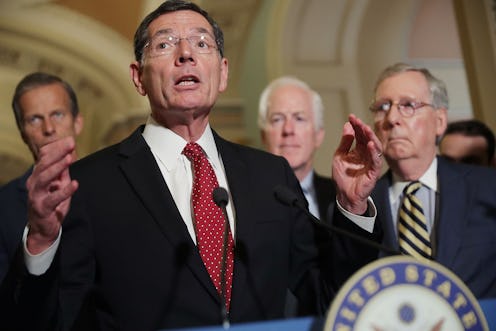News
Saudi Arabia Could Pay 9/11 Victims' Families
The U.S. House of Representatives voted on a bill allowing 9/11 victims to sue Saudi Arabia on Friday, Sept. 9. The bill, which was sponsored by Texas Sen. John Cornyn and New York Sen. Chuck Schumer, passed in the Senate in May. So, how much could Saudi Arabia have to pay victims of 9/11?
The bill passed on Friday morning in the House and could allow victims' families to file lawsuits against the Saudi government for its alleged role in the attacks that took place nearly 15 years ago. President Obama previously expressed opposition to the bill, however, suggesting that, "This is a matter of how generally the United States approaches our interactions with other countries. If we open up the possibility that individuals and the United States can routinely start suing other governments, then we are also opening up the United States to being continually sued by individuals in other countries." According to the New York Times, the administration's position on the matter has not changed since.
It's unclear how much the Saudi state would have to pay victims' families, but the country's foreign minister Adel al-Jubeir warned in March that if the bill were to pass into law, Saudi Arabia would sell $750 billion in U.S. assets, according to CNN.
In June 2016, a previously classified congressional report that alleged potential ties between some Saudi government officials, intelligence agents, and 9/11 hijackers was released. According to the Intercept, the 2002 report noted, "While in the United States, some of the September 11th hijackers were in contact with or received assistance from, individuals who may be connected with the Saudi government." However, the report also read, "It should be clear that this Joint Inquiry has made no final determinations as to the reliability or sufficiency of the information," so it seems that the speculation over Saudi involvement in the attacks remained just that.
Regarding the bill itself, House Speaker Paul Ryan expressed concern over the effects it could have on U.S. foreign relations. He said, "I think we need to review it to make sure that we're not making mistakes with our allies and that we're not catching people up in this that shouldn't be caught up in this," CNN reported. Now that the bill has passed in both the House and the Senate, the final decision depends on whether the White House plans to veto the bill.
The Washington Post reported that advocates of the bill are growing weary that the White House may attempt to "pocket veto the legislation" — meaning they would leave the bill unsigned until the legislative session comes to an end — as lawmakers prepare to leave Washington to focus on elections. Terry Strada, the national chair for 9/11 Families United For Justice Against Terrorism, told the Washington Post, "I don’t think they would have done all this work just to let it fall apart at the end."
